 This academic year we appointed Dr Sally Adams as our first Lecturer in Legal Practice, Law Clinics and the SQE (to cite the full title, which shows the breadth and depth of this exciting new role).
This academic year we appointed Dr Sally Adams as our first Lecturer in Legal Practice, Law Clinics and the SQE (to cite the full title, which shows the breadth and depth of this exciting new role).
In the Q & A below, Sally speaks about her prior experience, and reflects on her ambitions in the new role.
You’re joining the Law department as the first Lecturer in Legal Practice, with special responsibility for Law Clinics and the SQE, a particularly wide-ranging and ambitious role. Tell us a little bit about how the role appealed to you, and specific elements of your professional and research experience that you’re seeking to bring to Goldsmiths in performing this role?
I was excited by the opportunity to join Goldsmiths’ Law department. As Goldsmiths’ law degrees have been designed from the outset with a focus on experiential learning and an eye to the SQE, the Lecturer in Legal Practice role seemed a perfect fit with both Goldsmiths’ approach and my background and interests.
Where did you work, and where did you study, before joining Goldsmiths?
For the past year, I have been a visiting lecturer at the University of Law teaching law and sociology to undergraduates.
In 2019 I completed a PhD in Law at King’s College London. My thesis considered how immigration law regulating high-skilled migration to the UK informed and was informed by mainstream migration narratives and how, in turn, these narratives contributed to highly skilled migrants’ identity formation.
Before starting my PhD, I was a solicitor in practice. I completed my training contract at a legal aid firm in Newcastle upon Tyne and stayed with the firm post-qualification to specialise in immigration law. I subsequently joined the Immigration Department at London firm Kingsley Napley where I worked for some ten years, initially as a solicitor and then as a partner.
The Department of Law is very passionate about connecting legal theory with legal practice. What are the key challenges and opportunities in doing that?
In my experience of legal practice, law was understood almost exclusively as an instrument or tool to be used to achieve client objectives. In the academy however this instrumental view of law is but one of many ways to conceptualise law. Nevertheless, the practice of law and academic law or legal theory are closely connected. Indeed, the links and tensions between theory and practice and the extent to which one informs the other was something that I only appreciated fully when undertaking my doctoral research.
Integrating theory and practice is challenging. Concepts of morality for example may seem far removed from litigating a claim in negligence. However, by studying legal theory alongside aspects of practice, that is, by ‘doing’ law with reference to contemporary real-life issues, not only helps to highlight the connections and ruptures between specific laws and their theoretical underpinnings but also helps to encourage students to interrogate commonplace legal and social assumptions and practices.
What would you advise students joining Law School right now? How can they strike a good balance between pursuing academic excellence, on the one hand, and building a solid CV, demonstrating close engagement with the external world, on the other?
There is no right answer to this. We each have strengths and weaknesses, different needs and priorities and competing demands on our time. Noting that there is no single approach to studying law, I think students should understand what they most want to achieve during their time at Goldsmiths and try to allocate their time accordingly. This should not be a one-off exercise but rather an on-going conversation between students and staff in recognition that students’ focus and aims and therefore the balance of their activities can and undoubtedly will change over time.
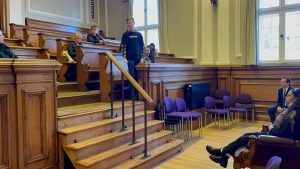
Year 1 LLB students participating in a debating exercise during welcome week (September 2021). The SQE2 module enables students to practice legal skills central to the examination for qualifying as a solicitor.
Goldsmiths Law takes a very proactive approach to the SQE, embedding some preparation for this radically different new examination for qualifying as a solicitor into the degree. This includes a Year 3 specialist module, SQE2 Practical Legal Skills in Context, that you’ll be leading on. Tell us about your plans for this module.
The SQE 2 module will not stand alone but will build on the substantive and practical skills that students will have already developed during their time at Goldsmiths. My aim is for the module to support students in developing some of the key skills and know-how that lawyers need to succeed in their professional lives. The module’s content and methods of assessment will be closely aligned to those of the SQE 2 itself to enable students to prepare for the real thing. The emphasis will be very much on ‘doing law’: students will practise their skills – client interviewing, legal drafting, case analysis and so on – with reference to scenarios similar to those encountered in practice.
More broadly, what are you looking forward to the most being at Goldsmiths?
I am really looking forward to engaging with students and members of the department to both support and learn from them. Although I enjoyed teaching online last year, perhaps more than I expected, it will be good to be back in the classroom face to face.
What hobbies are you leaning into?
After 18 months of intermittent lockdowns, I am tentatively rediscovering London’s cultural riches. I have also just started a wine tasting course so hope to be able to distinguish between red and black fruit aromas by the end of the year.
Other than that, I enjoy walking – both hiking across fields with the dog and strolling around unfamiliar parts of London and other cities.
 The learning never stops in our programme, and we continuously link our students with relevant events in central London (in addition to embedding field trips to legal institutions, law courts and law firms in London as part of curricular activity). We invited our students to attend a film screening, Q & A and launch of a Legal Empowerment project at global law firm Simmons and Simmons, on October 25. We were delighted to hear that a few of them managed to attend in person, while others watched the livestream.
The learning never stops in our programme, and we continuously link our students with relevant events in central London (in addition to embedding field trips to legal institutions, law courts and law firms in London as part of curricular activity). We invited our students to attend a film screening, Q & A and launch of a Legal Empowerment project at global law firm Simmons and Simmons, on October 25. We were delighted to hear that a few of them managed to attend in person, while others watched the livestream. This academic year we appointed Dr Sally Adams as our first Lecturer in Legal Practice, Law Clinics and the SQE (to cite the full title, which shows the breadth and depth of this exciting new role).
This academic year we appointed Dr Sally Adams as our first Lecturer in Legal Practice, Law Clinics and the SQE (to cite the full title, which shows the breadth and depth of this exciting new role).
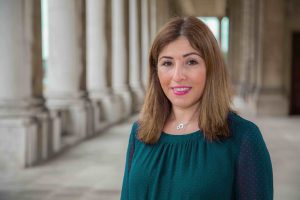 On 12 May 2021, the Department for Digital, Culture, Media and Sports published the Draft Online Safety Bill. The Joint Committee on the Draft Online Safety Bill has initiated an inquiry and called for evidence on to scrutinise it. Dr Aysem Diker Vanberg (Lecturer in Law at Goldsmiths), Dr Kim Barker, Dr Guido Noto La Diega and Dr Ruth Flaherty have given
On 12 May 2021, the Department for Digital, Culture, Media and Sports published the Draft Online Safety Bill. The Joint Committee on the Draft Online Safety Bill has initiated an inquiry and called for evidence on to scrutinise it. Dr Aysem Diker Vanberg (Lecturer in Law at Goldsmiths), Dr Kim Barker, Dr Guido Noto La Diega and Dr Ruth Flaherty have given 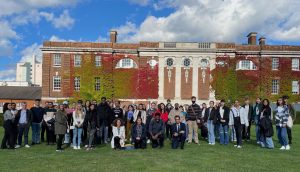
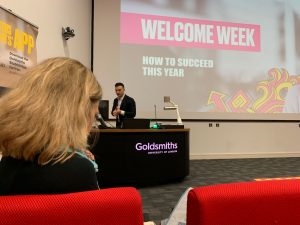 Dr Dagmar Myslinska, Dr Plamen Dinev and Mr Jean-Michel Villot spoke next, about student welfare and student support, with a focus on our dynamic personal tutoring system, examinations and progression as well as negotiating their journey into the degree through technology – what apps to download to ensure they’re up to speed with announcements and opportunities advertised by the department; how to communicate with the team; where to access their learning materials…
Dr Dagmar Myslinska, Dr Plamen Dinev and Mr Jean-Michel Villot spoke next, about student welfare and student support, with a focus on our dynamic personal tutoring system, examinations and progression as well as negotiating their journey into the degree through technology – what apps to download to ensure they’re up to speed with announcements and opportunities advertised by the department; how to communicate with the team; where to access their learning materials…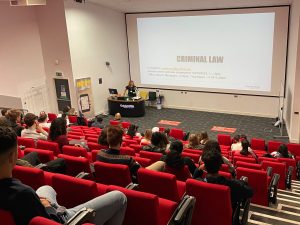 After a welcome lunch break where the students had a wonderful opportunity to mingle and get to know each other, the afternoon session kicked off with the Year 1 teaching team introducing their modules. Dr Alex Dymock highlighted how Criminal Law is a research led module informed by her expertise in sexual offences, offences against the person and obscenity law.
After a welcome lunch break where the students had a wonderful opportunity to mingle and get to know each other, the afternoon session kicked off with the Year 1 teaching team introducing their modules. Dr Alex Dymock highlighted how Criminal Law is a research led module informed by her expertise in sexual offences, offences against the person and obscenity law.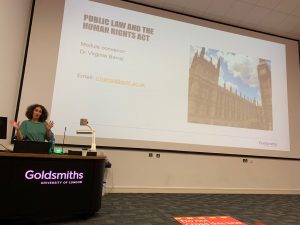
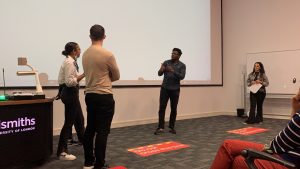 It was now time for the students to get involved, and our guest speaker, Michael Olatokun, who is a Research Leader in Citizenship and the Rule of Law, and the Head of Public and Youth Engagement, at the Bingham Centre for the Rule of Law, gave the cohort an outstanding opportunity to discuss and reflect on what makes them passionate about studying law and a consensus quickly built on how law is such a crucial tool to drive change and bring about social justice. Michael first passionately recounted his personal story and what brought him to pursue a career as a barrister, no doubt inspiring many along the way. He then led a highly interactive session, with students involved throughout, on the importance of the right to protest as a fundamental human right.
It was now time for the students to get involved, and our guest speaker, Michael Olatokun, who is a Research Leader in Citizenship and the Rule of Law, and the Head of Public and Youth Engagement, at the Bingham Centre for the Rule of Law, gave the cohort an outstanding opportunity to discuss and reflect on what makes them passionate about studying law and a consensus quickly built on how law is such a crucial tool to drive change and bring about social justice. Michael first passionately recounted his personal story and what brought him to pursue a career as a barrister, no doubt inspiring many along the way. He then led a highly interactive session, with students involved throughout, on the importance of the right to protest as a fundamental human right.